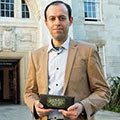Professor Caucher Birkar

You get ideas from someone, somewhere, and you create something new. You contribute something new and create more beautiful things.
Professor Caucher Birkar
Following his passion for mathematics, he began studies at the University of Tehran but in his final undergraduate year relocated to the UK as a refugee, seeking political asylum.
Having been placed in Nottingham by the UK Government, Birkar enrolled at the University of Nottingham, meeting mathematician Vyacheslav Shokurov, who sparked his interest in a relatively neglected subfield of algebraic geometry, birational geometry. While studying for his PhD, Birkar was awarded the Cecil King Travel Scholarship by the London Mathematical Society as the most promising PhD student.
More recently, Birkar’s work at Cambridge has included much of the modern development of ideas in the field, in particular his proof on the boundedness of Fano varieties published in 2016, for which he was given the Fields Medal in 2018. His citation for the prize also noted his pioneering work on minimal model theory. News of Birkar’s Fields Medal became global when it was unfortunately stolen, after the ceremony in Rio. Thankfully, the committee awarded him a replacement medal a few days later.
Birkar said at the time, “This has been widely covered in the media, and now I am more famous than I would have been… And the number of people who know what a Fields Medal is, is way more than it was last week."
On winning the medal he said “To go from the point that I didn’t imagine meeting these people to the point where someday I hold a medal myself — I just couldn’t imagine that this would come true.”
During the course of his career Birkar has received numerous awards including the Philip Leverhulme Prize (2010), the American Mathematical Society Moore Research Article Prize (2016), and the London Mathematical Society Whitehead prize (2018).
References:
- Quanta Magazine (quantamagazine.org)
- Royal Society (royalsociety.org)
- Varsity (varsity.co.uk)
- London Mathematical Society (lms.ac.uk)
- Birational geometry (wikipedia.org)
- Boundedness of Fano varieties (arxiv.org)
- Fields Medal - International Mathematical Union (mathunion.org)
- E H Moore Research Article Prize (ams.org)
- London Mathematical Society Whitehead prize (lms.ac.uk)
